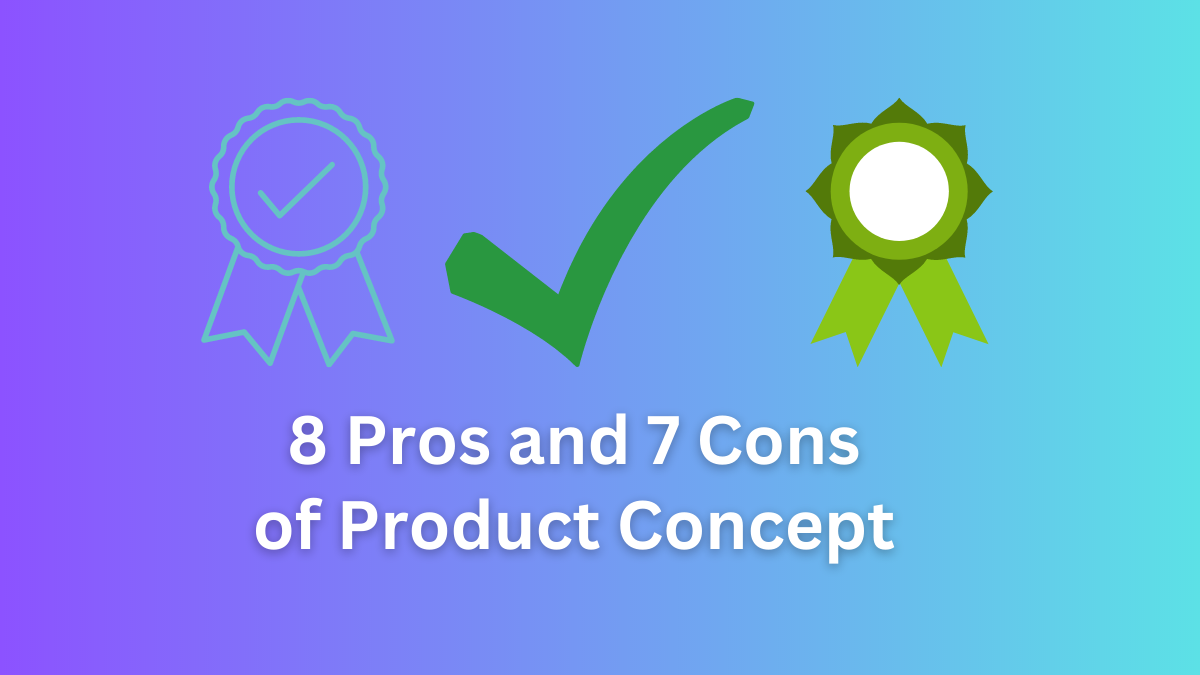Pros and Cons of Product Concept
Product concept in marketing refers to the belief that consumers opt for a product that has higher quality and performance. It argues consumers choose product quality over product price.
Let’s explore some notable pros and cons of product concept of marketing.
Pros of Product Concept
The product concept of marketing offers several advantages to businesses. Here, we delve into eight distinct pros of this marketing philosophy:
Quality Assurance
At its core, the product concept places a central emphasis on the creation of high-quality goods or services. This steadfast commitment to quality ensures that customers receive products that not only fulfill but surpass their expectations. By consistently delivering on quality, businesses forge a foundation of trust and loyalty among their customer base.
Customer Satisfaction
The product concept’s hallmark is its dedication to refining and augmenting products through continuous improvements and enhanced features. This meticulous attention to detail empowers businesses to craft offerings that are tailor-made to address specific customer needs. This meticulousness translates into heightened customer satisfaction and facilitates the cultivation of positive and enduring customer relationships.
Related: Types of Consumer Needs
Competitive Edge
The pursuit of excellence inherent in the product concept affords companies a distinct competitive advantage. When customers perceive your products as superior to those offered by competitors, the propensity to choose your brand over others naturally escalates. This advantage amplifies brand preference and elevates customer loyalty.
Strong Brand Image
A consistent commitment to furnishing top-notch products endows brands with a sterling reputation. This positive brand image goes a long way in transforming customers into brand advocates who not only patronize your products but also passionately endorse them to others.
Innovation Cultivation
Central to the product concept’s ethos is the cultivation of an environment conducive to ongoing innovation. Companies driven by this concept are unceasingly engaged in the pursuit of enhancing their products. This drive culminates in the regular introduction of novel features, cutting-edge designs, and innovative technologies.
Enhanced Profitability
Discerning customers are often willing to pay premium prices for products that exude superior quality. This willingness allows companies to command higher price points, thereby translating into enhanced profit margins that fuel sustainable growth.
Read Also: Production Concept of Marketing
Fostering Curiosity
The integration of innovative features or improvements triggers a sense of curiosity among customers. The allure of exploring these latest offerings kindles customers’ interest, which can potentially lead to heightened sales volume and increased visibility for the brand.
Market Leadership
Exemplary delivery of quality products can propel companies to the rank of market leadership. Such companies, known for their commitment to innovation and excellence, assume the role of trendsetters, attracting customers and influencing industry standards.
Cons of Product Concept
The product concept of marketing, while offering numerous benefits, also comes with several limitations that companies should be aware of. Let’s explore the 7 key disadvantages of product concept:
Neglecting Customer Preferences
One of the significant drawbacks of the product concept is its potential to disregard customer preferences. Companies may focus so intensely on enhancing product quality that they overlook aligning their offerings with the evolving desires and preferences of their target audience. This oversight can lead to a mismatch between what customers want and what the company offers.
Limited Market Suitability
The product concept is particularly effective for markets where customers prioritize quality over price. However, in markets where price consciousness prevails, this approach might fall short. Such customers are more inclined to opt for lower-priced products, even if they lack the cutting-edge features or premium quality emphasized by the product concept.
Read Also: The 4 Cs of Marketing
Overemphasis on Features
The unyielding pursuit of enhancing product features can sometimes lead to feature overload. Introducing too many features, especially those that are irrelevant or unnecessary, can overwhelm customers and detract from the core value proposition of the product.
High Production Costs
The relentless focus on product quality and innovation often entails higher production costs. From research and development to incorporating advanced technologies, these expenses can drive up the overall cost of production. This, in turn, can lead to higher pricing, potentially deterring price-sensitive customers.
Limited Long-Term Focus
The product concept can sometimes foster a shortsighted outlook, with companies focusing more on short-term product enhancements than on broader, long-term marketing strategies. This can hinder their ability to adapt to changing market dynamics, emerging trends, and evolving customer preferences.
Competitive Pressure
The constant pursuit of producing the best-in-class products can create intense competitive pressure. Companies may engage in a perpetual race to outdo competitors in terms of quality and innovation. This can lead to a cycle of escalating costs, aggressive promotional efforts, and strained resources.
Sustainability Concerns
The product concept’s uncompromising emphasis on constant product improvements might inadvertently neglect environmental and sustainability considerations. The rush to introduce new features or technologies could result in excessive resource consumption or the generation of electronic waste, potentially conflicting with eco-conscious consumer sentiments.
Read Next: 8 Pros and 7 Cons of Production Concept of Marketing
Arti Kushmi holds a BBS (Bachelor in Business Studies) degree and shares her business and marketing knowledge through this website. While not writing she will be reading and enjoying the moment.
